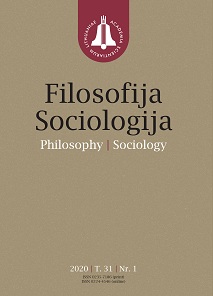Šeiminių praktikų vaidmuo ir šeimos daryba migracijos kontekste: Lietuvos atvejis
The Role of Family Practices in Doing Family in the Context of Migration: Case of Lithuania
Author(s): Vida ČesnuitytėSubject(s): Customs / Folklore, Sociology, Cultural Anthropology / Ethnology, Family and social welfare, Migration Studies
Published by: Lietuvos mokslų akademijos leidykla
Keywords: doing family across borders; family practices; routine practices; family traditions; festivities; migration;
Summary/Abstract: The aim of the research is to analyse the role of family practices in the Lithuanian family formation under normal circumstances and in the case of migration of family members. The research object is family practices, which include routine practices, traditions and festivities. Hypothesis H is tested in the research: family practices are important for the Lithuanian family formation because they define the boundary between family members and non-family members, depending on their place of residence – within the country or abroad. The hypothesis is tested based on the empirical data collected in Lithuania: 2018 data collected in a quota survey of the country’s population. The survey was carried out in the framework of the researchers’ group project ‘Global Migration and the Lithuanian Family: Family Practices, Care Circulation and Return Strategies’ whose funding was provided by the Lithuanian Research Council (LMTLT) (Contract No. S-MIP-17-117). The analysis of 13 family practices grouped into four formal groups (routine practices, traditions, religious festivities and secular festivities) supports the hypothesis and suggests that family practices involving individuals contribute to family formation, both in usual life and in migration circumstances when family formation takes place across national borders. The power of gathering together family members, both in usual life and when a family member emigrates, is characterized by festivities, first and foremost by St. Christmas Eve. In addition, in the context of migration, family members are brought together by common financial issues, holidays at least once a year and festivity of St. Christmas. Meanwhile, household issues, daily routine and meals together at least once a week are losing their role of family gathering in the context of migration. The family practices like birthdays or New Year’s Eve celebrations bring together non-family members mostly.
Journal: Filosofija. Sociologija
- Issue Year: 31/2020
- Issue No: 2
- Page Range: 128-138
- Page Count: 11
- Language: Lithuanian

